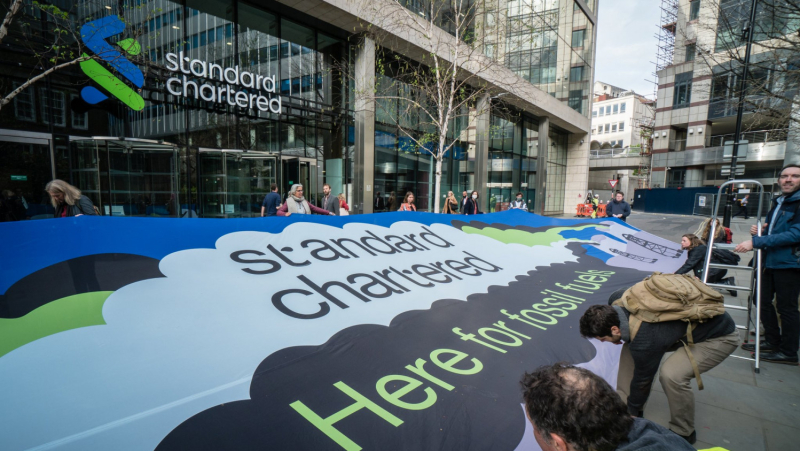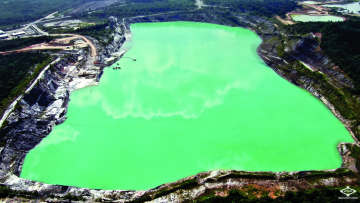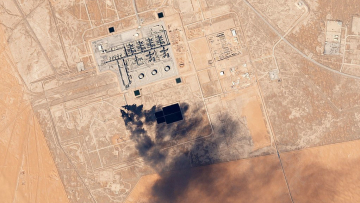Standard Chartered Bank hit with protests on opposite sides of the world as fossil fuel vote approaches

As Standard Chartered’s Annual General Meeting approaches on 4th May, people on both sides of the planet took action to call on the bank to end its finance for the expansion of fossil fuels. In London, protesters unfurled a huge 20-metre banner calling on the bank to stop funding fossil fuels. In Jakarta and Kalimantan, Indonesian protesters demanded the bank stop funding coal companies like Adaro, which the bank’s own research shows is aligned with 5-6°C of global warming.
Market Forces and Friends Provident Foundation have filed a shareholder resolution calling for Standard Chartered to align its financing with the goal of net zero by 2050. Standard Chartered claims to support net zero by 2050, despite continuing to finance companies and projects that expand the scale of the fossil fuel industry. The International Energy Agency (IEA) stated last year that meeting the net zero goal means no new coal mines, coal plants or oil and gas fields can be brought online, and warns that many of the new LNG terminals currently proposed are not needed. The shareholder resolution calls on the bank to align itself with the IEA’s net zero scenario.
Standard Chartered is the only UK bank facing a shareholder-proposed resolution on climate change at its AGM this year.
The resolution proponents point out that although the bank has a net zero by 2050 target, its actions do not match its rhetoric, given that the bank has:
- Provided almost US$ 40 billion in finance to fossil fuels between the signing of the Paris Agreement and the end of 2021,
- Recently financed companies and projects expanding the scale of the fossil fuel industry, such as Saudi Aramco, the world’s biggest greenhouse gas polluter, and a US$ 3.49 billion loan for the Scarborough-Pluto LNG project, which independent analysis has concluded “represents a bet against the world implementing the Paris Agreement”,
- Earned the title of UK bank with the highest financing for new coal plant developers in Asia (US$ 4.7 billion, October 2018-20), and
- So far failed to join 15 other major global banks and rule out funding the disastrous East Africa Crude Oil Pipeline, which would be the longest heated oil pipeline in the world.
The bank’s management has filed its own shareholder proposal (Resolution 31 in the Notice), asking shareholders to endorse its current plans, which Market Forces has demonstrated falls well short of the goal of net zero by 2050.
Larger banks than Standard Chartered are also forging ahead with bolder climate policies, such as ING Bank, which this month pledged to end all financing of new oil and gas projects.
Adam McGibbon, UK Campaign Lead at Market Forces, said:
Standard Chartered’s fossil fuel financing leaves a worldwide trail of destruction. From funding coal companies with business plans that will lead to 5-6°C of warming to financing climate-wrecking new gas projects, the bank’s actions speak far louder than their ‘net zero’ rhetoric.
All over the world, communities want the bank to change – and shareholders have an opportunity to make the bank change.
The choice for investors is simple – a real net zero plan put forward by Market Forces and the Friends Provident Foundation, or a zero ambition plan put forward by the bank’s management.
Jeri Arsmoro, Campaigner at 350.org Indonesia, said:
“Financing Adaro means ensuring the climate crisis worsens. Indonesians, especially young people, have been increasingly aware of the dangers of the climate crisis. Banks and investors have to choose whether they want to invest in humankind or support the coal elite,” says Jeri Asmoro, digital campaigner at 350.org Indonesia.



